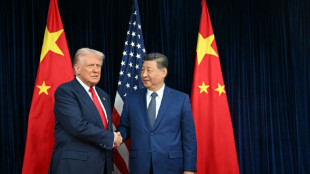
-
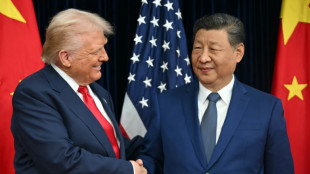 'Significant' Xi, Trump talks win cautious optimism in China
'Significant' Xi, Trump talks win cautious optimism in China
-
French justice minister visits jailed former president Sarkozy

-
 Eurozone growth beats expectations in third quarter
Eurozone growth beats expectations in third quarter
-
Bali trial begins for 3 accused of Australian's murder

-
 Dutch election a photo finish between far-right, centrists
Dutch election a photo finish between far-right, centrists
-
IOC removes Saudi Arabia as host of inaugural Esports Olympics

-
 Russia batters Ukraine energy sites, killing two
Russia batters Ukraine energy sites, killing two
-
Shell's net profit jumps despite lower oil prices

-
 Pakistani security source says Afghanistan talks 'likely' to resume
Pakistani security source says Afghanistan talks 'likely' to resume
-
Fentanyl, beans and Ukraine: takeaways from Trump-Xi's 'great meeting'
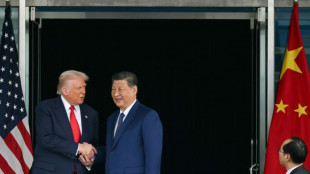
-
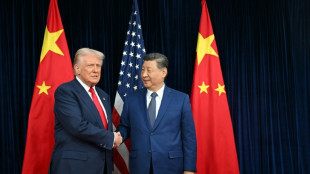 Asia markets fluctuate as investors examine Trump-Xi talks
Asia markets fluctuate as investors examine Trump-Xi talks
-
Branson's Virgin moves closer to launching Eurostar rival
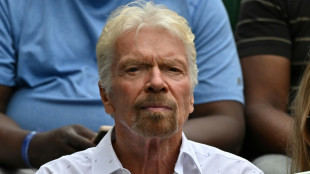
-
 Russia hits Ukraine energy sites, killing one, wounding children
Russia hits Ukraine energy sites, killing one, wounding children
-
Asia markets fluctuate as investors mull Trump-Xi talks
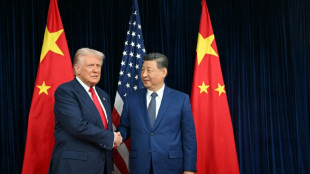
-
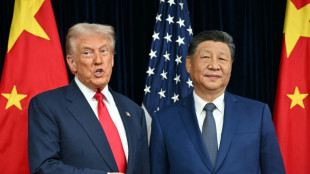 Trump, Xi ease fight on tariffs, rare earths
Trump, Xi ease fight on tariffs, rare earths
-
Volkswagen posts 1-billion-euro loss on tariffs, Porsche woes
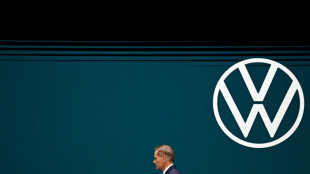
-
 'Fight fire with fire': California mulls skewing electoral map
'Fight fire with fire': California mulls skewing electoral map
-
Fentanyl, beans and Ukraine: Trump hails 'success' in talks with Xi
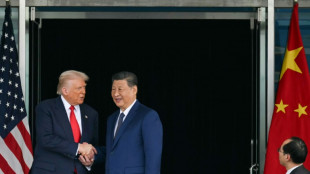
-
 'Nowhere to sleep': Melissa upends life for Jamaicans
'Nowhere to sleep': Melissa upends life for Jamaicans
-
Irish octogenarian enjoys new lease on life making harps

-
 Tanzania blackout after election chaos, deaths feared
Tanzania blackout after election chaos, deaths feared
-
G7 meets on countering China's critical mineral dominance

-
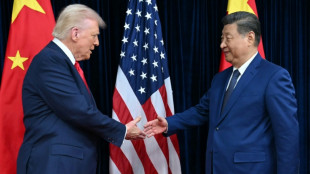 Trump hails tariff, rare earth deal with Xi
Trump hails tariff, rare earth deal with Xi
-
Court rules against K-pop group NewJeans in label dispute

-
 India's Iyer says 'getting better by the day' after lacerated spleen
India's Iyer says 'getting better by the day' after lacerated spleen
-
Yesavage fairytale carries Blue Jays to World Series brink

-
 Bank of Japan keeps interest rates unchanged
Bank of Japan keeps interest rates unchanged
-
Impoverished Filipinos forge a life among the tombstones

-
 Jokic posts fourth straight triple-double as Nuggets rout Pelicans
Jokic posts fourth straight triple-double as Nuggets rout Pelicans
-
UN calls for end to Sudan siege after mass hospital killings

-
 Teenage Australian cricketer dies after being hit by ball
Teenage Australian cricketer dies after being hit by ball
-
As Russia advances on Kupiansk, Ukrainians fear second occupation

-
 Trade truce in balance as Trump meets 'tough negotiator' Xi
Trade truce in balance as Trump meets 'tough negotiator' Xi
-
China to send youngest astronaut, mice on space mission this week

-
 Yesavage gem carries Blue Jays to brink of World Series as Dodgers downed
Yesavage gem carries Blue Jays to brink of World Series as Dodgers downed
-
With inflation under control, ECB to hold rates steady again

-
 Asia stocks muted with all eyes on Trump-Xi meeting
Asia stocks muted with all eyes on Trump-Xi meeting
-
Personal tipping points: Four people share their climate journeys

-
 Moto3 rider Dettwiler 'no longer critical' after crash: family
Moto3 rider Dettwiler 'no longer critical' after crash: family
-
US economy in the dark as government shutdown cuts off crucial data

-
 Trump orders nuclear testing resumption ahead of Xi talks
Trump orders nuclear testing resumption ahead of Xi talks
-
'Utter madness': NZ farmers agree dairy sale to French group

-
 Samsung posts 32% profit rise on-year in third quarter
Samsung posts 32% profit rise on-year in third quarter
-
30 years after cliffhanger vote, Quebec separatists voice hope for independence

-
 Taxes, labor laws, pensions: what Milei wants to do next
Taxes, labor laws, pensions: what Milei wants to do next
-
South Sudan's blind football team dreams of Paralympic glory

-
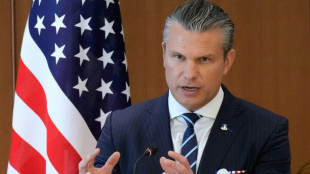 US says 4 killed in new strike on alleged Pacific drug boat
US says 4 killed in new strike on alleged Pacific drug boat
-
What we do and don't know about Rio's deadly police raid

-
 'They slit my son's throat' says mother of teen killed in Rio police raid
'They slit my son's throat' says mother of teen killed in Rio police raid
-
Arteta hails 'special' Dowman after 15-year-old makes historic Arsenal start


Mexico's energy reforms test relations with US
Relations between the United States and Mexico are under strain as the Mexican government pushes ahead with planned energy sector reforms that have alarmed Washington and foreign investors.
President Andres Manuel Lopez Obrador wants to strengthen the state-owned electricity provider and roll back the effects of liberalization under previous governments that he says favored private companies.
That has prompted warnings that Mexico is in danger of violating its commitments under a North American trade deal with the United States and Canada by prioritizing state-run entities heavily dependent on fossil fuels.
In November, Lopez Obrador's ruling party pushed back its deadline for the approval of a constitutional reform bill until April, following a backlash from the United States, Canada and foreign investors.
The next few months "will be critical," a US diplomatic source in Mexico told reporters on condition of anonymity.
A row between the neighboring countries would have potential consequences for wider cooperation in key areas such as trade, migration and fighting drug cartels.
The reforms would ensure that the state-owned Federal Electricity Commission (CFE) has at least 54 percent of the electricity market -- compared with 38 percent now -- and the private sector no more than 46 percent.
The government says the move is to prevent soaring power prices -- a hot-button political issue given inflation has hit a 20-year high above seven percent.
The reforms also aim to move towards a state monopoly in the exploration and mining of lithium, a vital material in the production of electric car batteries.
In January several US Democratic party senators urged President Joe Biden's administration to "more forcefully express concerns about President Lopez Obrador's detrimental fossil fuel agenda."
The blunt call came in a letter to Secretary of State Antony Blinken and Secretary of Energy Jennifer Granholm from Senate Foreign Relations Committee chairman Bob Menendez and three other members of Congress.
"If enacted, the Mexican government would cancel renewable energy permits, contracts, and certificates," they warned.
The legislation would "threaten at least $44 billion in private investment in Mexico's energy sector, will negatively impact US private sector investment in Mexico, and is antithetical to the historically strong US-Mexico economic relationship," they said.
- Investments at stake -
"One of the most controversial points of the reform has been its proposal to cancel all the contracts that were signed with private companies for the generation and supply of electricity," said the Mexican branch of the international auditing and consultancy network Deloitte.
"This possibility is worrying different players in the market, because the private sector has invested a large amount of resources in the construction and start-up of modern facilities capable of producing cleaner and cheaper electricity," it added.
Following suggestions that the changes could even amount to a form of indirect expropriation, Mexico's Energy Minister Rocio Nahle said this week that "not a single screw will be expropriated."
The United States has found itself fighting on the same side as domestic opponents of the reforms, which must be approved by two-thirds of the members of Congress.
They include Senate ruling party heavyweight Ricardo Monreal, who wanted the bill to be amended, as well as the governors of northern states such as Baja California and Sonora bordering the United States.
Baja California wants to stay connected "to the fourth largest economy in the world, which is California," said the US diplomatic source.
Washington says it is also concerned that the reform will favor polluting coal-based energy, to the detriment of renewable energy.
Nahle has dismissed such suggestions as a "lie," saying that only three percent of Mexico's electricity comes from coal, compared with some 20 percent in the United States and more than 50 percent in China.
"Each country adapts to the resources it has, and on this point we are not going to criticize others," the minister said, in what was seen as a jab at Washington.
O.Mousa--SF-PST

